
There seems to be a prevailing attitude among broadcast journalists that they really don’t need to worry as much about spelling as the poor print people do. This attitude would be amusing if it did not lead to so many professional atrocities.I’m not going to let my print colleagues off the hook, though. Both branches of the profession over-rely on their spell-checks. TV people seem to forget about their supers, short for superimpositions, the words that appear on the screen; or about the crawlers, the news vignettes that “crawl” across the bottom of the screen. Someone has to write those things, preferably someone properly schooled in the English language.
Some years back, I was watching an interview on ABC’s “Good Morning America” with the general counsel of some corporation or governmental entity, who was offering her legal opinion on whatever her outfit was on the hot seat for. The interview and the issue were largely forgettable except for the super, which labeled her the “general council for . . .”
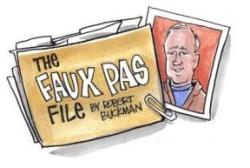 I lacked the time to call ABC, but I was gratified that when they replayed the interview in the next half hour, the super correctly read “general counsel.” I suspect some other journalism professor called them, or maybe some former print journalist on ABC News’ staff went running into the control room shouting, “Hey, you idiots, that’s the wrong ‘counsel!’”
I lacked the time to call ABC, but I was gratified that when they replayed the interview in the next half hour, the super correctly read “general counsel.” I suspect some other journalism professor called them, or maybe some former print journalist on ABC News’ staff went running into the control room shouting, “Hey, you idiots, that’s the wrong ‘counsel!’”
In an earlier column, I alluded to a TV station in the Dallas-Fort Worth area that had a super on a report on a homecoming at Fort Hood that identified a soldier as a member of the “First Calvary Division” instead of the First Cavalry Division. Spell-check no help there, either.
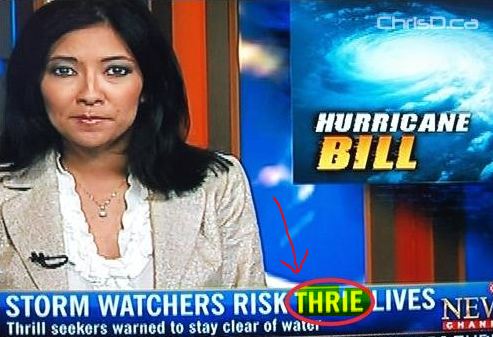
A spell check could have caught this misspelling of “their ” that “Chris D.” noted on his blog. (Credit, Chris D, Chrisd.ca)
I’ve lost track of how many times I’ve seen supers or crawlers with incorrect singular or plural possessives, with the apostrophe in the wrong place, or even worse, a plural formed by inserting an apostrophe, especially with proper names, i.e., “the Kennedy’s” instead of “the Kennedys.”
Correct usages:
Nation mourns Kennedy’s death
The Kennedys’ political dynasty
Kennedys gather for funeral
Radio people may not have to worry about supers and crawlers, but they still have to read from a prepared script, which, once again, someone has to write.
Last week, NPR’s Debbie Elliott was merely the latest broadcast person I’ve heard over the years commit one of my major pet peeves. In an update from Washington on the government’s reaction to the Deepwater Horizon disaster, she said, “The oil rig sunk last week in the Gulf of Mexico.”
Now, when I was a kid, we all learned in elementary school how to properly conjugate “sink.” The past tense is “sank” and the participle is “sunk.” For example, the Titanic sank in 1912 after striking an iceberg, but, the USS Arizona was sunk by Japanese bombs in 1941. What could be simpler? Over the years, this corruption of using “sunk” as the simple past tense has grown exponentially in verbal and written communication, but just because millions of people also incorrectly say “he don’t” or “had went” doesn’t mean it’s acceptable for broadcast journalists to say it in a professional news report.
The other NPR reporters, as well as the ones I’ve heard on ABC and CNN, have correctly said “sank.”
A related pet peeve: Saying “Golf” instead of “Gulf.” I’ve heard that for decades! (Elliott did correctly say “Gulf.”) I heard the local anchor at one of the Lafayette stations say “Golf” three times during last night’s newscast. No, she wasn’t talking about Tiger Woods.
Which is not to say that a spell-check shouldn’t be used; it just shouldn’t be used as a crutch. It can still help catch egregiously misspelled words or typos.
Cases in point: I remember in the late ‘80s when one of the New Orleans TV stations reported on a local airplane crash, and the super reported the suspected cause: “Turbulance.” Ouch! And during a visit to San Antonio a few years ago I saw a super on a crime story that identified the cop being interviewed as a “Deputy Sherrif.” In both cases, I called the station to educate them.
A spell-check would have kept CNN from making an embarrassing gaffe last year. When President Obama made his first state visit to Canada, CNN carried it live. The crawler reported, “President Obama arrives in Ottowa on state visit.”
I blinked in disbelief, thinking surely my eyes were playing tricks, and waited for the crawler to come around again. Yep, it said “Ottowa.” That crawler continued to make the rounds several times, until all of a sudden all the crawlers disappeared for several minutes. When they reappeared, this time that blurb read “Ottawa.” No doubt CNN headquarters in Atlanta was bombarded with irate calls from north of the border.
(Ironically, it was at the opening Braves-Blue Jays game in Atlanta in the 1992 World Series that the Canadian maple leaf flag was displayed upside down, infuriating our northern neighbors.)
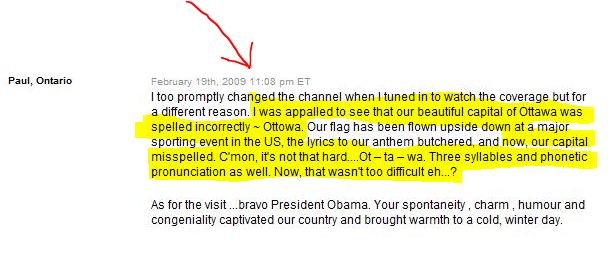
EVEN COMMENTERS COMPLAIN : When President Barack Obama went to Canada for his first state visit in February 2009, CNN ran a crawler that misspelled Ottawa as Ottowa. This screenshot from the comments section of CNN’s Anderson Cooper’s blog that day shows that CNN’s viewers did catch the error. (Credit: CNN)
Personal anecdote: In December 1992, when U.S. Marines landed in Somalia, they were met on the beach by TV crews with bright lights. One of the local TV stations in Lafayette sought me out to comment on whether I thought the media should have done something so intrusive and foolish. Coincidentally, they tracked me down at Fort Leavenworth, Kan., where I was serving a two-week Army Reserve assignment with the Foreign Military Studies Office. When I returned home, the station sent me a VHS tape of the audio interview and I saw to my astonishment that the super said I was at “Fort Levinsworth.” If the reporter had bothered to ask me how to spell it, instead of guessing because she was too lazy to look it up, I would have told her. But I didn’t volunteer to tell her; because of the famous nearby federal prison, I assumed anyone knew how to spell “Leavenworth.”
Geographic names do seem to be the bane of broadcasters, but in an age of spell-checks and Google there is no excuse for them.
Pronunciation provides a whole related set of problems unique for broadcast journalists, and I feel for them; it took me a while before I mastered “ Ahmadinejad,” for example. Broadcast news copy is supposed to provide correct pronunciations in parentheses, but they don’t always, and the consequences can be hilarious for the audience but mortifying for the station or network. Many years ago, Monroe, La., experienced a disastrous flood when the Ouachita River overflowed. The reporter for a national radio network assumed, incorrectly, it should be pronounced “Oo-uh-CHEE-ta” instead of “WASH-i-tah.” Bad guess! That was in the pre-spell-check, pre-Google era, but even they aren’t much help with proper pronunciation.
Then there was the memorable day when the late, great Paul Harvey had a report about someone with a pet Chihuahua, which he pronounced, “chi-HOO-ah-HOO-ah.” Needless to say, his switchboard in Chicago lit up immediately!
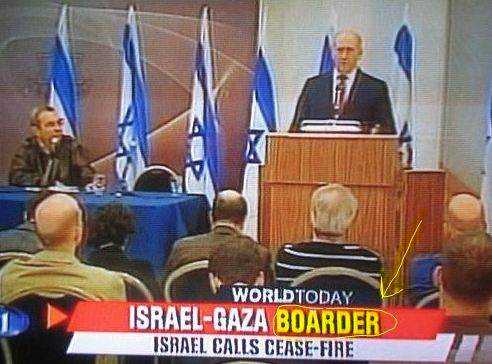
This TV station spelled border as “boarder” –see yellow highlight shown in this screenshot from FunnyTypos.com. (Credit: Dell Atlas, FunnyTypos.com)
So, my broadcast brethren, you do need to worry about spelling and properly written scripts, and you can’t rely on a spell-check. A useful resource for your newsrooms would be Dave Dowling’s The Wrong Word Dictionary, which covers 2,000 frequently confused words (no, I’m not getting a kickback from him), so your supers or crawlers don’t say council instead of counsel, or principle instead of principal, capitol instead of capital, or, as I saw just last night on that same Lafayette station, insure instead of ensure.
Don’t be too smug, print people; next time I’ll relate some horror stories I’ve seen in newspapers, magazines, online or in student assignments.
ROBERT BUCKMAN, Ph.D., is an associate professor of communication and head of the print journalism sequence at the University of Louisiana at Lafayette. He is a member of both the Ethics Committee and the International Journalism Committee of the Society of Professional Journalists. He is the author of a reference book on Latin America and a regular freelance contributor to newspapers on Latin American politics.




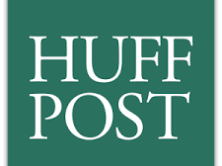


Thanks for pointing out how spelling and grammar errors hurt the image of broadcasts, I thought I was the only one that noticed. It reflects on the whole broadcast by taking the viewer away from the subject matter.
Ed Smith
ConductKnockoutBroadcastInterviews.com/blog